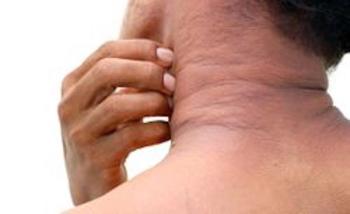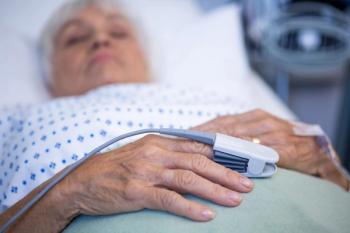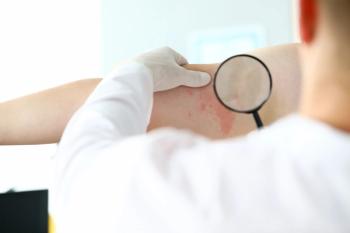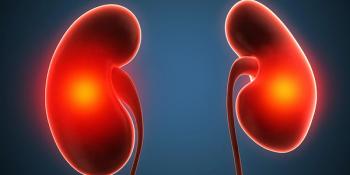
Patrick Burnett, MD, PhD, FAAD, chief medical officer of Arcutis Biotherapeutics, discusses clinical recommendations for patients with moderate to severe psoriasis, particularly the need for shared decision-making.

Matthew is an associate editor for The American Journal of Managed Care® (AJMC®). He joined AJMC® in 2019 and creates content for Medical World News®, a 24-hour online program developed MJH Life Sciences® focusing on pressing topics within managed care, as well as the nonwork-related activities of health care stakeholders.
He has a BA in journalism & media studies and economics from Rutgers University. You can connect with Matthew on LinkedIn.

Patrick Burnett, MD, PhD, FAAD, chief medical officer of Arcutis Biotherapeutics, discusses clinical recommendations for patients with moderate to severe psoriasis, particularly the need for shared decision-making.

Patients with Parkinson disease demonstrated significant reduction in depressive symptoms with citalopram and pramipexole, with pramipexole showing slightly more benefit in improving quality of life.

Athena Gierbolini, president of Hope for HS, a nonprofit advocacy group for those affected by hidradenitis suppurativa (HS), discussed the misconceptions she faced from clinicians regarding her clinical symptoms of HS prior to diagnosis.

SUNSHINE and SUNRISE trial data will be submitted to the FDA as part of Novartis’ Biologics License Application (BLA) for secukinumab in hidradenitis suppurativa.

Significantly more patients given ruxolitinib cream vs vehicle demonstrated rapid improvements in itch that were sustained over time.

David E. Koren, PharmD, MPH, BCPS, AAHIVP, FIDSA, infectious disease clinical pharmacist at Temple University Hospital, provides an update on current preventive efforts to address the monkeypox public health emergency in the United States and what steps are needed to protect at-risk populations.

Initiation of antipsychotics was nearly 3 times more common in patients with Parkinson disease vs controls, with the incidence rate found to increase approximately 4 years prior to PD diagnosis.

Jason Ezra Hawkes, MD, MS, FAAD, board-certified dermatologist and associate professor of dermatology at the University of California Davis in Sacramento, spoke on diagnostic challenges for atopic dermatitis and tips for clinicians in screening for the condition.

A 16% lower adjusted risk in recurrent Clostridioides difficile infections was found in 2018 compared with 2013 across diverse US sites part of the CDC’s Emerging Infections Program.

Patrick Burnett, MD, PhD, FAAD, chief medical officer of Arcutis Biotherapeutics, speaks on the positive safety and efficacy profile shown in the DERMIS-1 and DERMIS-2 trials exploring use of roflumilast cream in patients with chronic plaque psoriasis, including those with intertriginous disease.

Athena Gierbolini, president of Hope for HS, a nonprofit advocacy group for those affected with hidradenitis suppurativa (HS), speaks on the quality of life burden she has experienced during her HS disease journey.

David E. Koren, PharmD, MPH, BCPS, AAHIVP, FIDSA, infectious disease clinical pharmacist at Temple University Hospital, discussed the risk posed by monkeypox among immunocompromised individuals and men who have sex with men, as well as the need for educational efforts to address misconceptions tied to the disease.

Patients with alopecia areata were less likely to report decisional regret regarding treatment when dermatologists incorporated shared decision-making, with prescription of Janus kinase (JAK) inhibitors associated with the lowest decisional regret.

Neil Goldfarb, president and CEO of the Greater Philadelphia Business Coalition on Health (GPBCH), reviews the key topics to be addressed at the 2022 GPBCH Wellness Summit.

Pediatric patients who developed atopic dermatitis (AD) before 2 years of age had an increased risk of neurodevelopmental dysfunction, including gross and fine motor skills, at 6 years old.

Significant worsening of physical and mental symptoms of Parkinson disease was shown in a meta-analysis of diverse patients during the COVID-19 pandemic, with those of lower-income countries shown to be exceptionally vulnerable.

Inactive occupational status and low educational level were associated with pain, late disease onset, and greater number of affected areas in patients with hidradenitis suppurativa.

Older adults who reported longer total sleep time, lower rapid eye movement (REM) sleep percentage, and higher minimum oxygen saturations during REM sleep had an increased risk of developing Parkinson disease (PD).

David E. Koren, PharmD, MPH, BCPS, AAHIVP, FIDSA, infectious disease clinical pharmacist at Temple University Hospital, speaks on gaps in monkeypox vaccine availability and access and steps to improve response to the public health emergency.

Patients with atopic dermatitis (AD) were not found to be at greater risk of venous thromboembolism, regardless of Janus kinase inhibitor use, according to this new meta-analysis.

Lack of state funding and understaffing are threatening the vaccination campaign for novel Omicron-specific booster shots; experts explore the differences between subcutaneous and intradermal delivery of monkeypox vaccines; HHS’ Office for Civil Rights is struggling to manage rising cases of cyberattacks on US health care organizations.

Brindley Brooks, who founded HS Connect (HSconnect.org), a patient advocacy group for those affected by hidradenitis suppurativa (HS), spoke on misconceptions she’s encountered on her HS disease journey and the importance for physicians to be conscientious of their advice to patients.

Jason Ezra Hawkes, MD, MS, FAAD, board-certified dermatologist and associate professor of dermatology at the University of California Davis in Sacramento, explained the utility of type 2 inflammation pathways and the microbiome in understanding the immune dysregulation associated with atopic dermatitis (AD).

Patrick Burnett, MD, PhD, FAAD, chief medical officer of Arcutis Biotherapeutics, discusses the mechanism of action for roflumilast cream, the only phosphodiesterase-4 inhibitor approved by the FDA for the treatment of plaque psoriasis in patients aged 12 and older.

A case report of a patient with acne fulminans, a rare form of acne vulgaris, discussed the clinical manifestations of the disease, physical examination findings, and management strategies.

Findings of a meta-analysis show that use of dietary elimination had a minimal effect on the severity of atopic dermatitis and may increase the risk of developing immunoglobulin E–mediated food allergy.

Patients with Parkinson disease who adhered to a healthy diet pattern and active lifestyle had a lower rate of all-cause mortality than those reporting poor diet quality and lack of physical activity.

Brindley Brooks, who founded HS Connect (HSconnect.org), a patient advocacy group for those affected with hidradenitis suppurativa (HS), spoke on key areas of HS comprehension and management that warrant further investigation in clinical research.

Investigator Global Assessment score of very severe atopic dermatitis (AD) was associated with dupilumab discontinuation due to adverse effects, although generally adequate 1-, 2-, and 3-year drug survival rates were also observed.

Korean patients with type 2 diabetes (T2D) who had reduced levels of estimated glomerular filtration rate and/or proteinuria, 2 hallmarks of diabetic kidney disease, had a greater risk of developing Parkinson disease.

259 Prospect Plains Rd, Bldg H
Cranbury, NJ 08512
© 2025 MJH Life Sciences®
All rights reserved.
